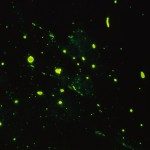Lien vers Pubmed [PMID] – 27005282
Int. J. Infect. Dis. 2016 May;46:107-14
The diagnosis of dog-mediated rabies in humans and animals has greatly benefited from technical advances in the laboratory setting. Approaches to diagnosis now include the detection of rabies virus (RABV), RABV RNA, or RABV antigens. These assays are important tools in the current efforts aimed at the global elimination of dog-mediated rabies. The assays available for use in laboratories are reviewed herein, as well as their strengths and weaknesses, which vary with the types of sample analyzed. Depending on the setting, however, the public health objectives and use of RABV diagnosis in the field will also vary. In non-endemic settings, the detection of all introduced or emergent animal or human cases justifies exhaustive testing. In dog RABV-endemic settings, such as rural areas of developing countries where most cases occur, the availability of or access to testing may be severely constrained. Thus, these issues are also discussed along with a proposed strategy to prioritize testing while access to rabies testing in the resource-poor, highly endemic setting is improved. As the epidemiological situation of rabies in a country evolves, the strategy should shift from that of an endemic setting to one more suitable for a decreased rabies incidence following the implementation of efficient control measures and when nearing the target of dog-mediated rabies elimination.

